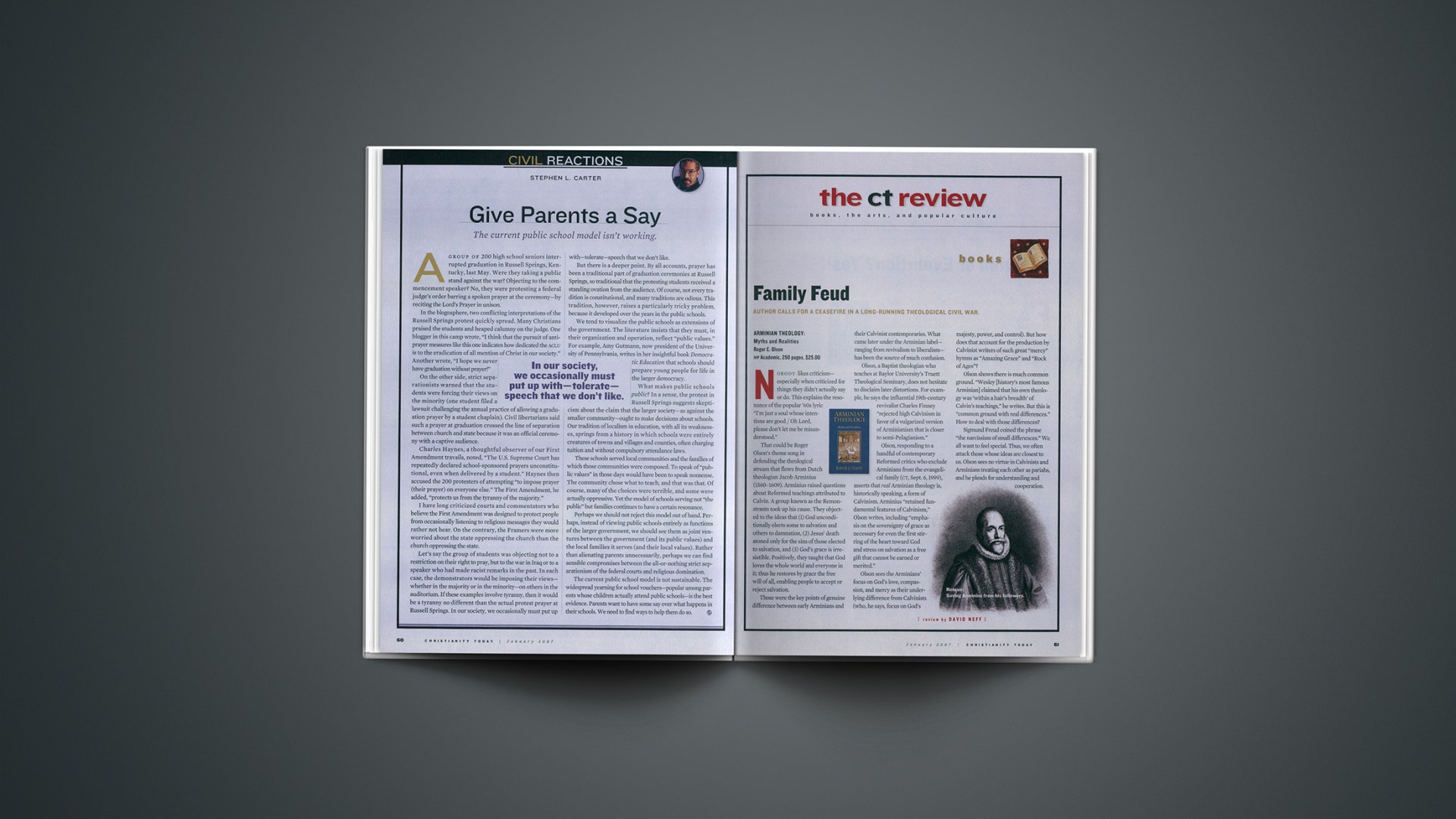Nobody likes criticism—especially when criticized for things they didn’t actually say or do. This explains the resonance of the popular ’60s lyric “I’m just a soul whose intentions are good / Oh Lord, please don’t let me be misunderstood.”
That could be Roger Olson’s theme song in defending the theological stream that flows from Dutch theologian Jacob Arminius (1560-1609). Arminius raised questions about Reformed teachings attributed to Calvin. A group known as the Remonstrants took up his cause. They objected to the ideas that (1) God unconditionally elects some to salvation and others to damnation, (2) Jesus’ death atoned only for the sins of those elected to salvation, and (3) God’s grace is irresistible. Positively, they taught that God loves the whole world and everyone in it; thus he restores by grace the free will of all, enabling people to accept or reject salvation.
Those were the key points of genuine difference between early Arminians and their Calvinist contemporaries. What came later under the Arminian label—ranging from revivalism to liberalism—has been the source of much confusion.
Olson, a Baptist theologian who teaches at Baylor University’s Truett Theological Seminary, does not hesitate to disclaim later distortions. For example, he says the influential 19th-century revivalist Charles Finney “rejected high Calvinism in favor of a vulgarized version of Arminianism that is closer to semi-Pelagianism.”
Olson, responding to a handful of contemporary Reformed critics who exclude Arminians from the evangelical family, asserts that real Arminian theology is, historically speaking, a form of Calvinism. Arminius “retained fundamental features of Calvinism,” Olson writes, including “emphasis on the sovereignty of grace as necessary for even the first stirring of the heart toward God and stress on salvation as a free gift that cannot be earned or merited.”
Olson sees the Arminians’ focus on God’s love, compassion, and mercy as their underlying difference from Calvinists (who, he says, focus on God’s majesty, power, and control). But how does that account for the production by Calvinist writers of such great “mercy” hymns as “Amazing Grace” and “Rock of Ages”?
Olson shows there is much common ground. “Wesley [history’s most famous Arminian] claimed that his own theology was ‘within a hair’s breadth’ of Calvin’s teachings,” he writes. But this is “common ground with real differences.” How to deal with those differences?
Sigmund Freud coined the phrase “the narcissism of small differences.” We all want to feel special. Thus, we often attack those whose ideas are closest to us. Olson sees no virtue in Calvinists and Arminians treating each other as pariahs, and he pleads for understanding and cooperation.
I agree. As an evangelical in a theologically liberal denomination, I embrace anyone who believes in total depravity, the priority of God’s saving grace over human response, and the affirmation, as Olson puts it, that “the saved person cannot boast because even faith is a gift of God.”
I doubt that those few Reformed spokesmen who questioned the evangelical credentials of Arminians will change their ways after reading this book. But who knows? The God of Calvinists and Arminians works in mysterious ways.
David Neff is editor of Christianity Today.
Copyright © 2007 Christianity Today. Click for reprint information.
Related Elsewhere:
Arminian Theology: Myths and Realities is available from ChristianBook.com and other retailers
Christian History & Biography has a helpful glossary of terms and an outline of the origins of Arminianism and TULIP, as well as issues on key theologians such as John Calvin, Dwight L. Moody, Jonathan Edwards, Charles Finney, and Charles H. Spurgeon
Christianity Today articles on Arminianism include:
Don’t Hate Me Because I’m Arminian | My Reformed friends sometimes treat me like the enemy, but actually we need each other. (September 6, 1999)
Has God Been Held Hostage by Philosophy? | A forum on free-will theism, a new paradigm for understanding God. (January 9, 1995)
The Problem with Evangelical Theologies | Ben Witherington III thinks there is something fundamentally weak about each branch of the movement. (November 2005)










